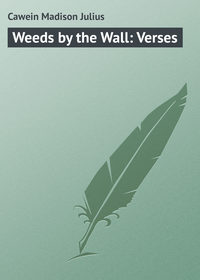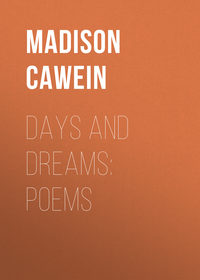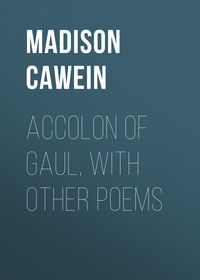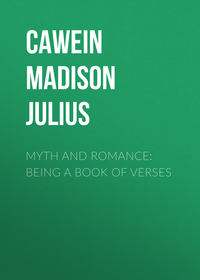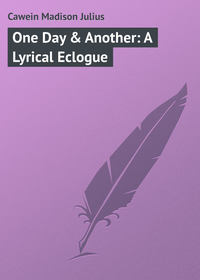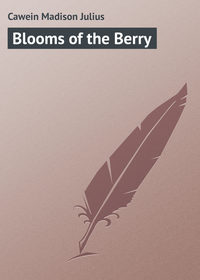Poems
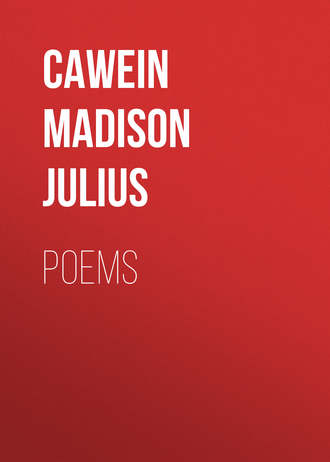 полная версия
полная версияPoems
Жанр: зарубежная поэзиязарубежная классиказарубежная старинная литературастихи и поэзиясерьезное чтениеcтихи, поэзия
Язык: Английский
Год издания: 2018
Добавлена:
Настройки чтения
Размер шрифта
Высота строк
Поля
A VOICE ON THE WIND
I She walks with the wind on the windy height When the rocks are loud and the waves are white, And all night long she calls through the night, "O my children, come home!" Her bleak gown, torn as a tattered cloud, Tosses around her like a shroud, While over the deep her voice rings loud,— "O my children, come home, come home! O my children, come home!"II Who is she who wanders alone, When the wind drives sheer and the rain is blown? Who walks all night and makes her moan, "O my children, come home!" Whose face is raised to the blinding gale; Whose hair blows black and whose eyes are pale, While over the world goes by her wail,— "O my children, come home, come home! O my children, come home!"III She walks with the wind in the windy wood; The dark rain drips from her hair and hood, And her cry sobs by, like a ghost pursued, "O my children, come home!" Where the trees loom gaunt and the rocks stretch drear, The owl and the fox crouch back with fear, As wild through the wood her voice they hear,— "O my children, come home, come home! O my children, come home!"IV Who is she who shudders by When the boughs blow bare and the dead leaves fly? Who walks all night with her wailing cry, "O my children, come home!" Who, strange of look, and wild of tongue, With wan feet wounded and hands wild-wrung, Sweeps on and on with her cry, far-flung,— "O my children, come home, come home! O my children, come home!"V 'Tis the Spirit of Autumn, no man sees, The mother of Death and of Mysteries, Who cries on the wind all night to these, "O my children, come home!" The Spirit of Autumn, pierced with pain, Calling her children home again, Death and Dreams, through ruin and rain,— "O my children, come home, come home! O my children, come home!"REQUIEM
I No more for him, where hills look down, Shall Morning crown Her rainy brow with blossom bands!— The Morning Hours, whose rosy hands Drop wildflowers of the breaking skies Upon the sod 'neath which he lies.— No more for him! No more! No more!II No more for him, where waters sleep, Shall Evening heap The long gold of the perfect days! The Eventide, whose warm hand lays Great poppies of the afterglow Upon the turf he rests below.— No more for him! No more! no more!Ill No more for him, where woodlands loom, Shall Midnight bloom The star-flowered acres of the blue! The Midnight Hours, whose dim hands strew Dead leaves of darkness, hushed and deep, Upon the grave where he doth sleep.— No more for him! No more! No more!IV The hills, that Morning's footsteps wake: The waves that take A brightness from the Eve; the woods And solitudes, o'er which Night broods, Their Spirits have, whose parts are one With him, whose mortal part is done. Whose part is done.LYNCHERS
At the moon's down-going let it be On the quarry hill with its one gnarled tree. The red-rock road of the underbrush, Where the woman came through the summer hush. The sumac high and the elder thick, Where we found the stone and the ragged stick. The trampled road of the thicket, full Of footprints down to the quarry pool. The rocks that ooze with the hue of lead, Where we found her lying stark and dead. The scraggy wood; the negro hut, With its doors and windows locked and shut. A secret signal; a foot's rough tramp; A knock at the door; a lifted lamp. An oath; a scuffle; a ring of masks; A voice that answers a voice that asks. A group of shadows; the moon's red fleck; A running noose and a man's bared neck. A word, a curse, and a shape that swings; The lonely night and a bat's black wings. At the moon's down-going let it be On the quarry hill with its one gnarled tree.THE PARTING
She passed the thorn-trees, whose gaunt branches tossed Their spider-shadows round her; and the breeze, Beneath the ashen moon, was full of frost, And mouthed and mumbled to the sickly trees, Like some starved hag who sees her children freeze. Dry-eyed she waited by the sycamore. Some stars made misty blotches in the sky. And all the wretched willows on the shore Looked faded as a jaundiced cheek or eye. She felt their pity and could only sigh. And then his skiff ground on the river rocks. Whistling he came into the shadow made By that dead tree. He kissed her dark brown locks; And round her form his eager arms were laid. Passive she stood, her secret unbetrayed. And then she spoke, while still his greeting kiss Ached in her hair. She did not dare to lift Her eyes to his—her anguished eyes to his, While tears smote crystal in her throat. One rift Of weakness humored might set all adrift. Fields over which a path, overwhelmed with burrs And ragweeds, noisy with the grasshoppers, Leads,—lost, irresolute as paths the cows Wear through the woods,—unto a woodshed; then, With wrecks of windows, to a huddled house, Where men have murdered men. A house, whose tottering chimney, clay and rock, Is seamed and crannied; whose lame door and lock Are bullet-bored; around which, there and here, Are sinister stains.—One dreads to look around.— The place seems thinking of that time of fear And dares not breathe a sound. Within is emptiness: The sunlight falls On faded journals papering the walls; On advertisement chromos, torn with time, Around a hearth where wasps and spiders build.— The house is dead: meseems that night of crime It, too, was shot and killed.KU KLUX
We have sent him seeds of the melon's core, And nailed a warning upon his door: By the Ku Klux laws we can do no more. Down in the hollow, 'mid crib and stack, The roof of his low-porched house looms black; Not a line of light at the door-sill's crack. Yet arm and mount! and mask and ride! The hounds can sense though the fox may hide! And for a word too much men oft have died. The clouds blow heavy toward the moon. The edge of the storm will reach it soon. The kildee cries and the lonesome loon. The clouds shall flush with a wilder glare Than the lightning makes with its angled flare, When the Ku Klux verdict is given there. In the pause of the thunder rolling low, A rifle's answer—who shall know From the wind's fierce hurl and the rain's black blow? Only the signature, written grim At the end of the message brought to him— A hempen rope and a twisted limb. So arm and mount! and mask and ride! The hounds can sense though the fox may hide!— For a word too much men oft have died.EIDOLONS
The white moth-mullein brushed its slim Cool, faery flowers against his knee; In places where the way lay dim The branches, arching suddenly, Made tomblike mystery for him. The wild-rose and the elder, drenched With rain, made pale a misty place,— From which, as from a ghost, he blenched; He walking with averted face, And lips in desolation clenched. For far within the forest,—where Weird shadows stood like phantom men, And where the ground-hog dug its lair, The she-fox whelped and had her den,— The thing kept calling, buried there. One dead trunk, like a ruined tower, Dark-green with toppling trailers, shoved Its wild wreck o'er the bush; one bower Looked like a dead man, capped and gloved, The one who haunted him each hour. Now at his side he heard it: thin As echoes of a thought that speaks To conscience. Listening with his chin Upon his palm, against his cheeks He felt the moon's white finger win. And now the voice was still: and lo, With eyes that stared on naught but night, He saw?—what none on earth shall know!— Was it the face that far from sight Had lain here, buried long ago? But men who found him,—thither led By the wild fox,—within that place Read in his stony eyes, 'tis said, The thing he saw there, face to face, The thing that left him staring dead.THE MAN HUNT
The woods stretch deep to the mountain side, And the brush is wild where a man may hide. They have brought the bloodhounds up again To the roadside rock where they found the slain. They have brought the bloodhounds up, and they Have taken the trail to the mountain way. Three times they circled the trail and crossed; And thrice they found it and thrice they lost. Now straight through the trees and the underbrush They follow the scent through the forest's hush. And their deep-mouthed bay is a pulse of fear In the heart of the wood that the man must hear. The man who crouches among the trees From the stern-faced men who follow these. A huddle of rocks that the ooze has mossed, And the trail of the hunted again is lost. An upturned pebble; a bit of ground A heel has trampled—the trail is found. And the woods re-echo the bloodhounds' bay As again they take to the mountain way. A rock; a ribbon of road; a ledge, With a pine tree clutching its crumbling edge. A pine, that the lightning long since clave, Whose huge roots hollow a ragged cave. A shout; a curse; and a face aghast; The human quarry is laired at last. The human quarry with clay-clogged hair And eyes of terror who waits them there. That glares and crouches and rising then Hurls clods and curses at dogs and men. Until the blow of a gun-butt lays Him stunned and bleeding upon his face. A rope; a prayer; and an oak-tree near, And a score of hands to swing him clear. A grim, black thing for the setting sun And the moon and the stars to gaze upon.MY ROMANCE
If it so befalls that the midnight hovers In mist no moonlight breaks, The leagues of the years my spirit covers, And my self myself forsakes. And I live in a land of stars and flowers, White cliffs by a silvery sea; And the pearly points of her opal towers From the mountains beckon me. And I think that I know that I hear her calling From a casement bathed with light— Through music of waters in waters falling Mid palms from a mountain height. And I feel that I think my love's awaited By the romance of her charms; That her feet are early and mine belated In a world that chains my arms. But I break my chains and the rest is easy— In the shadow of the rose, Snow-white, that blooms in her garden breezy, We meet and no one knows. And we dream sweet dreams and kiss sweet kisses; The world—it may live or die! The world that forgets; that never misses The life that has long gone by. We speak old vows that have long been spoken; And weep a long-gone woe: For you must know our hearts were broken Hundreds of years ago.A MAID WHO DIED OLD
Frail, shrunken face, so pinched and worn, That life has carved with care and doubt! So weary waiting, night and morn, For that which never came about! Pale lamp, so utterly forlorn, In which God's light at last is out. Gray hair, that lies so thin and prim On either side the sunken brows! And soldered eyes, so deep and dim, No word of man could now arouse! And hollow hands, so virgin slim, Forever clasped in silent vows! Poor breasts! that God designed for love, For baby lips to kiss and press; That never felt, yet dreamed thereof, The human touch, the child caress— That lie like shriveled blooms above The heart's long-perished happiness. O withered body, Nature gave For purposes of death and birth, That never knew, and could but crave Those things perhaps that make life worth,— Rest now, alas! within the grave, Sad shell that served no end of Earth.BALLAD OF LOW-LIE-DOWN
John-A-Dreams and Harum-Scarum Came a-riding into town: At the Sign o' the Jug-and-Jorum There they met with Low-lie-down. Brave in shoes of Romany leather, Bodice blue and gypsy gown, And a cap of fur and feather, In the inn sat Low-lie-down. Harum-Scarum kissed her lightly; Smiled into her eyes of brown: Clasped her waist and held her tightly, Laughing, "Love me, Low-lie-down!" Then with many an oath and swagger, As a man of great renown, On the board he clapped his dagger, Called for sack and sat him down. So a while they laughed together; Then he rose and with a frown Sighed, "While still 'tis pleasant weather, I must leave thee, Low-lie-down." So away rode Harum-Scarum; With a song rode out of town; At the Sign o' the Jug-and-Jorum Weeping tarried Low-lie-down. Then this John-a-dreams, in tatters, In his pocket ne'er a crown, Touched her, saying, "Wench, what matters! Dry your eyes and, come, sit down. "Here's my hand: we'll roam together, Far away from thorp and town. Here's my heart,—for any weather,— And my dreams, too, Low-lie-down. "Some men call me dreamer, poet: Some men call me fool and clown— What I am but you shall know it, Only you, sweet Low-lie-down." For a little while she pondered: Smiled: then said, "Let care go drown!" Up and kissed him…. Forth they wandered, John-a-dreams and Low-lie-down.ROMANCE
Thus have I pictured her:—In Arden old A white-browed maiden with a falcon eye, Rose-flushed of face, with locks of wind-blown gold, Teaching her hawks to fly. Or, 'mid her boar-hounds, panting with the heat, In huntsman green, sounding the hunt's wild prize, Plumed, dagger-belted, while beneath her feet The spear-pierced monster dies. Or in Brécéliand, on some high tower, Clad white in samite, last of her lost race, My soul beholds her, lovelier than a flower, Gazing with pensive face. Or, robed in raiment of romantic lore, Like Oriana, dark of eye and hair, Riding through realms of legend evermore, And ever young and fair. Or now like Bradamant, as brave as just, In complete steel, her pure face lit with scorn, At giant castles, dens of demon lust, Winding her bugle-horn. Another Una; and in chastity A second Britomart; in beauty far O'er her who led King Charles's chivalry And Paynim lands to war…. Now she, from Avalon's deep-dingled bowers,— 'Mid which white stars and never-waning moons Make marriage; and dim lips of musk-mouthed flowers Sigh faint and fragrant tunes,— Implores me follow; and, in shadowy shapes Of sunset, shows me,—mile on misty mile Of purple precipice,—all the haunted capes Of her enchanted isle. Where, bowered in bosks and overgrown with vine, Upon a headland breasting violet seas, Her castle towers, like a dream divine, With stairs and galleries. And at her casement, Circe-beautiful, Above the surgeless reaches of the deep, She sits, while, in her gardens, fountains lull The perfumed wind asleep. Or, round her brow a diadem of spars, She leans and hearkens, from her raven height, The nightingales that, choiring to the stars, Take with wild song the night. Or, where the moon is mirrored in the waves, To mark, deep down, the Sea King's city rolled, Wrought of huge shells and labyrinthine caves, Ribbed pale with pearl and gold. There doth she wait forever; and the kings Of all the world have wooed her: but she cares For none but him, the Love, that dreams and sings, That sings and dreams and dares.AMADIS AND ORIANA
From "Beltenebros at Miraflores" O sunset, from the springs of stars Draw down thy cataracts of gold; And belt their streams with burning bars Of ruby on which flame is rolled: Drench dingles with laburnum light; Drown every vale in violet blaze: Rain rose-light down; and, poppy-bright, Die downward o'er the hills of haze, And bring at last the stars of night! The stars and moon! that silver world, Which, like a spirit, faces west, Her foam-white feet with light empearled, Bearing white flame within her breast: Earth's sister sphere of fire and snow, Who shows to Earth her heart's pale heat, And bids her mark its pulses glow, And hear their crystal currents beat With beauty, lighting all below. O cricket, with thy elfin pipe, That tinkles in the grass and grain; And dove-pale buds, that, dropping, stripe The glen's blue night, and smell of rain; O nightingale, that so dost wail On yonder blossoming branch of snow, Thrill, fill the wild deer-haunted dale, Where Oriana, walking slow, Comes, thro' the moonlight, dreamy pale. She comes to meet me!—Earth and air Grow radiant with another light. In her dark eyes and her dark hair Are all the stars and all the night: She comes! I clasp her!—and it is As if no grief had ever been.— In all the world for us who kiss There are no other women or men But Oriana and Amadis.THE ROSICRUCIAN
I The tripod flared with a purple spark, And the mist hung emerald in the dark: Now he stooped to the lilac flame Over the glare of the amber embers, Thrice to utter no earthly name; Thrice, like a mind that half remembers; Bathing his face in the magic mist Where the brilliance burned like an amethyst.II "Sylph, whose soul was born of mine, Born of the love that made me thine, Once more flash on my eyes! Again Be the loved caresses taken! Lip to lip let our forms remain!— Here in the circle sense, awaken! Ere spirit meet spirit, the flesh laid by, Let me touch thee, and let me die."III Sunset heavens may burn, but never Know such splendor! There bloomed an ever Opaline orb, where the sylphid rose A shape of luminous white; diviner White than the essence of light that sows The moons and suns through space; and finer Than radiance born of a shooting-star, Or the wild Aurora that streams afar.IV "Look on the face of the soul to whom Thou givest thy soul like added perfume! Thou, who heard'st me, who long had prayed, Waiting alone at morning's portal!— Thus on thy lips let my lips be laid, Love, who hast made me all immortal! Give me thine arms now! Come and rest Weariness out on my beaming breast!"V Was it her soul? or the sapphire fire That sang like the note of a seraph's lyre? Out of her mouth there fell no word— She spake with her soul, as a flower speaketh. Fragrant messages none hath heard, Which the sense divines when the spirit seeketh…. And he seemed alone in a place so dim That the spirit's face, who was gazing at him, For its burning eyes he could not see: Then he knew he had died; that she and he Were one; and he saw that this was she.THE AGE OF GOLD
The clouds that tower in storm, that beat Arterial thunder in their veins; The wildflowers lifting, shyly sweet, Their perfect faces from the plains,— All high, all lowly things of Earth For no vague end have had their birth. Low strips of mist that mesh the moon Above the foaming waterfall; And mountains, that God's hand hath hewn, And forests, where the great winds call,— Within the grasp of such as see Are parts of a conspiracy; To seize the soul with beauty; hold The heart with love: and thus fulfill Within ourselves the Age of Gold, That never died, and never will,— As long as one true nature feels The wonders that the world reveals.BEAUTY AND ART
The gods are dead; but still for me Lives on in wildwood brook and tree Each myth, each old divinity. For me still laughs among the rocks The Naiad; and the Dryad's locks Drop perfume on the wildflower flocks. The Satyr's hoof still prints the loam; And, whiter than the wind-blown foam, The Oread haunts her mountain home. To him, whose mind is fain to dwell With loveliness no time can quell, All things are real, imperishable. To him—whatever facts may say— Who sees the soul beneath the clay, Is proof of a diviner day. The very stars and flowers preach A gospel old as God, and teach Philosophy a child may reach; That cannot die; that shall not cease; That lives through idealities Of Beauty, ev'n as Rome and Greece. That lifts the soul above the clod, And, working out some period Of art, is part and proof of God.THE SEA SPIRIT
Ah me! I shall not waken soon From dreams of such divinity! A spirit singing 'neath the moon To me. Wild sea-spray driven of the storm Is not so wildly white as she, Who beckoned with a foam-white arm To me. With eyes dark green, and golden-green Long locks that rippled drippingly, Out of the green wave she did lean To me. And sang; till Earth and Heaven seemed A far, forgotten memory, And more than Heaven in her who gleamed On me. Sleep, sweeter than love's face or home; And death's immutability; And music of the plangent foam, For me! Sweep over her! with all thy ships, With all thy stormy tides, O sea!— The memory of immortal lips For me!GARGAPHIE
"Succinctae sacra Dianae".—OVID
There the ragged sunlight lay Tawny on thick ferns and gray On dark waters: dimmer, Lone and deep, the cypress grove Bowered mystery and wove Braided lights, like those that love On the pearl plumes of a dove Faint to gleam and glimmer.II There centennial pine and oak Into stormy cadence broke: Hollow rocks gloomed, slanting, Echoing in dim arcade, Looming with long moss, that made Twilight streaks in tatters laid: Where the wild hart, hunt-affrayed, Plunged the water, panting.III Poppies of a sleepy gold Mooned the gray-green darkness rolled Down its vistas, making Wisp-like blurs of flame. And pale Stole the dim deer down the vale: And the haunting nightingale Throbbed unseen—the olden tale All its wild heart breaking.IV There the hazy serpolet, Dewy cistus, blooming wet, Blushed on bank and bowlder; There the cyclamen, as wan As first footsteps of the dawn, Carpeted the spotted lawn: Where the nude nymph, dripping drawn, Basked a wildflower shoulder.V In the citrine shadows there What tall presences and fair, Godlike, stood!—or, gracious As the rock-rose there that grew, Delicate and dim as dew, Stepped from boles of oaks, and drew Faunlike forms to follow, who Filled the forest spacious!—VI Guarding that Boeotian Valley so no foot of man Soiled its silence holy With profaning tread—save one, The Hyantian: Actæon, Who beheld, and might not shun Pale Diana's wrath; undone By his own mad folly.VII Lost it lies—that valley: sleeps In serene enchantment; keeps Beautiful its banished Bowers that no man may see; Fountains that her deity Haunts, and every rock and tree Where her hunt goes swinging free As in ages vanished.THE DEAD OREAD
Her heart is still and leaps no more With holy passion when the breeze, Her whilom playmate, as before, Comes with the language of the bees, Sad songs her mountain cedars sing, And water-music murmuring. Her calm white feet,—erst fleet and fast As Daphne's when a god pursued,— No more will dance like sunlight past The gold-green vistas of the wood, Where every quailing floweret Smiled into life where they were set. Hers were the limbs of living light, And breasts of snow; as virginal As mountain drifts; and throat as white As foam of mountain waterfall; And hyacinthine curls, that streamed Like crag-born mists, and gloomed and gleamed. Her presence breathed such scents as haunt Moist, mountain dells and solitudes; Aromas wild as some wild plant That fills with sweetness all the woods: And comradeships of stars and skies Shone in the azure of her eyes. Her grave be by a mossy rock Upon the top of some wild hill, Removed, remote from men who mock The myths and dreams of life they kill: Where all of beauty, naught of lust May guard her solitary dust.THE FAUN
The joys that touched thee once, be mine! The sympathies of sky and sea, The friendships of each rock and pine, That made thy lonely life, ah me! In Tempe or in Gargaphie. Such joy as thou didst feel when first, On some wild crag, thou stood'st alone To watch the mountain tempest burst, With streaming thunder, lightning-sown, On Latmos or on Pelion. Thy awe! when, crowned with vastness, Night And Silence ruled the deep's abyss; And through dark leaves thou saw'st the white Breasts of the starry maids who kiss Pale feet of moony Artemis. Thy dreams! when, breasting matted weeds Of Arethusa, thou didst hear The music of the wind-swept reeds; And down dim forest-ways drew near Shy herds of slim Arcadian deer. Thy wisdom! that knew naught but love And beauty, with which love is fraught; The wisdom of the heart—whereof All noblest passions spring—that thought As Nature thinks, "All else is naught." Thy hope! wherein To-morrow set No shadow; hope, that, lacking care And retrospect, held no regret, But bloomed in rainbows everywhere, Filling with gladness all the air. These were thine all: in all life's moods Embracing all of happiness: And when within thy long-loved woods Didst lay thee down to die—no less Thy happiness stood by to bless.



